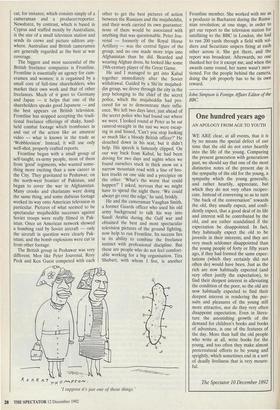One hundred years ago
AN APOLOGY FROM AGE TO YOUTH
WE ARE clear, at all events, that it is by no means the special defect of our time that the old do not enter heartily into the life of the young. Comparing the present generation with generations past, we should say that one of the most distinctive notes of the present day is the sympathy of the old for the young, a sympathy which the young generally, and rather heartily, appreciate, but which they do not very often recipro- cate. Instead of conversing so as to turn "the back of the conversation" towards the old, they usually expect, and confi- dently expect, that a good deal of its life and interest will be contributed by the old, and are rather scandalised if the expectation be disappointed. In fact, they habitually expect the old to be juvenile in their interests; and they are very much seldomer disappointed than the young people of forty or fifty years ago, if they had formed the same expec- tations (which they certainly did not often do) would have been. Just as the rich are now habitually expected (and very often justify the expectation), to find their deepest interest in alleviating the condition of the poor, so the old are now habitually expected to find their deepest interest in rendering the pur- suits and pleasures of the young still more attractive, nor do they very often disappoint expectation. Even in litera- ture the astonishing growth of the demand for children's books and books of adventure, is one of the features of the day. More than half the old people who write at all, write books for the young, and too often they make almost preternatural efforts to be young and– sprightly, which sometimes end in a sort of deadly liveliness that is very mourn- ful.
The Spectator 10 December 1892


































































 Previous page
Previous page